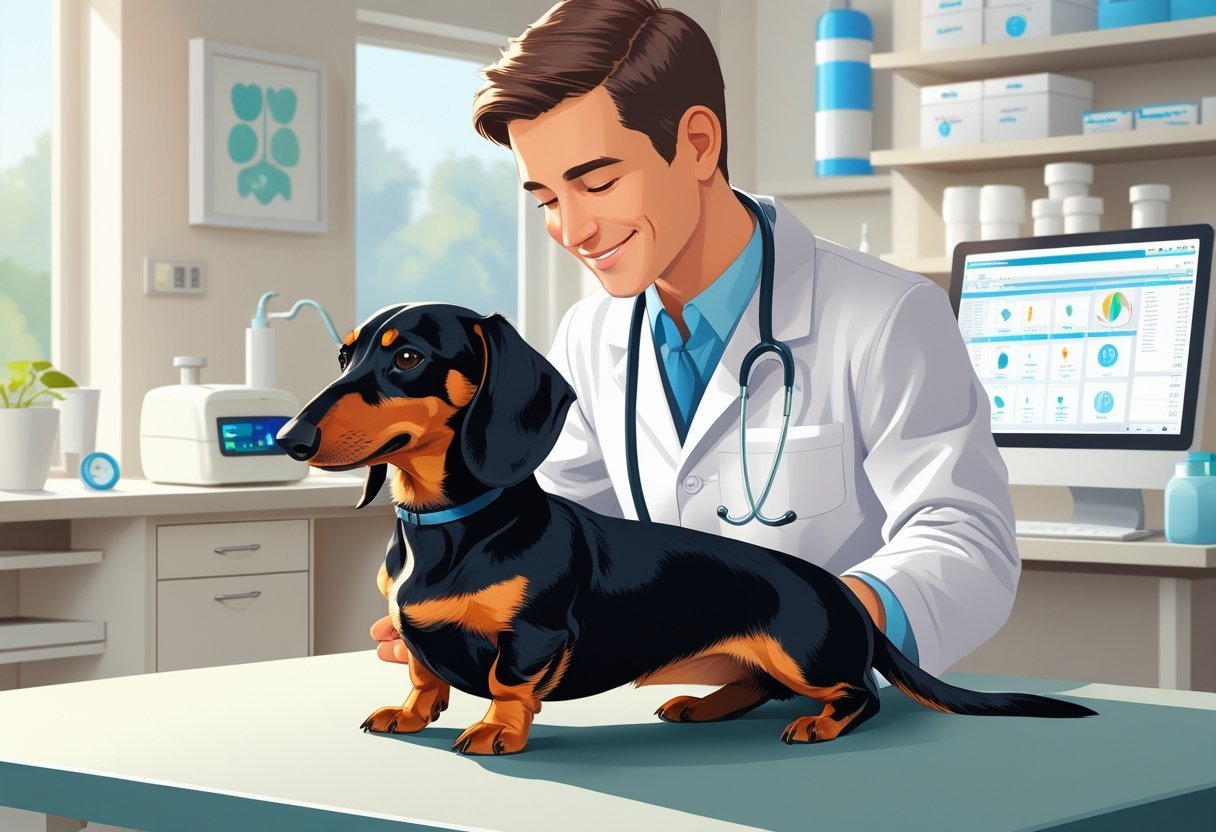Want your dachshund to stay healthy and happy? 🐾 Regular vet check ups make a big difference.
Visiting the vet on a routine schedule helps you catch health issues early 🩺 and keep your doxie feeling their best every day.
With those long backs and short little legs, dachshunds need some extra care and attention ❤️ to keep them in good shape.
Maybe you’re wondering how often your dachshund should see the vet or what actually happens during these visits. 🤔 A solid check up plan covers basic exams, recommended tests, and advice on nutrition and weight.
These steps help prevent problems like back injuries or obesity 🚫, which seem to pop up a lot in this breed.
Key Takeaways 📝
- Regular vet visits help keep your dachshund healthy. 🐶
- Early detection and prevention are important for long-term health. ⏳
- A good care plan includes exams, tests, and watching for illness. 🩺
🐾 Free Dachshund Care Guide
Download our free checklist to ensure your Dachshund stays happy, healthy, and well-loved!
Get Your Free Guide 🐶Understanding Dachshund Vet Check Ups
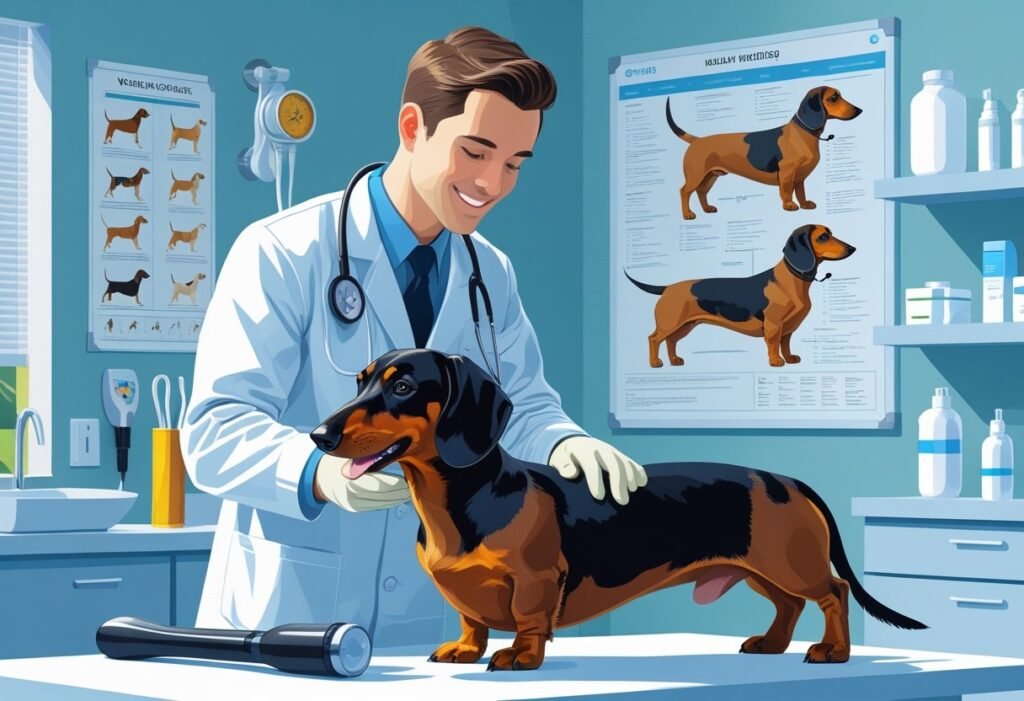
Dachshunds have unique health concerns, so regular vet visits really matter. 🐾 Early checks and breed-specific tests can catch problems before they get out of hand.
Why Regular Veterinary Visits Matter 🩺
Vet check ups help spot issues like back problems and dental disease early 🦷, often before you notice anything’s wrong. Visiting the vet every 6–12 months lets you treat problems before they get bad or painful.
Vets check your dog’s weight, teeth, skin, joints, and eyes. 👀 They’ll listen to the heart and lungs ❤️ and watch how your dog moves.
If your dachshund starts limping or just isn’t acting like themselves, the vet can look for causes right away. 🐶 Annual vaccines protect your dog from diseases like rabies and parvovirus. 💉
Blood tests and stool checks help catch hidden problems, like worms or kidney issues 🧪. These regular visits help your dachshund live longer and feel better.

🩺 The Swiftest: Insurance Comparison Tool – Find the Best Health Coverage for Your Doxie
Quickly compare pet insurance plans to make sure your Dachshund gets top-notch care without breaking the bank. Perfect for keeping vet check-ups and emergency visits stress-free.
- See side-by-side coverage and costs in minutes 📊
- Find plans that cover IVDD and breed-specific needs 🐾
- Save money while ensuring the best possible care
Unique Health Needs of Dachshunds 🐕
Dachshunds are prone to intervertebral disc disease (IVDD) because of their long spine. 🦴 This can lead to back pain or even paralysis.
Your vet might show you how to handle and lift your dog safely to prevent injuries. 👐 Obesity is another common problem for dachshunds, even just a few extra pounds can put stress on their back. ⚖️
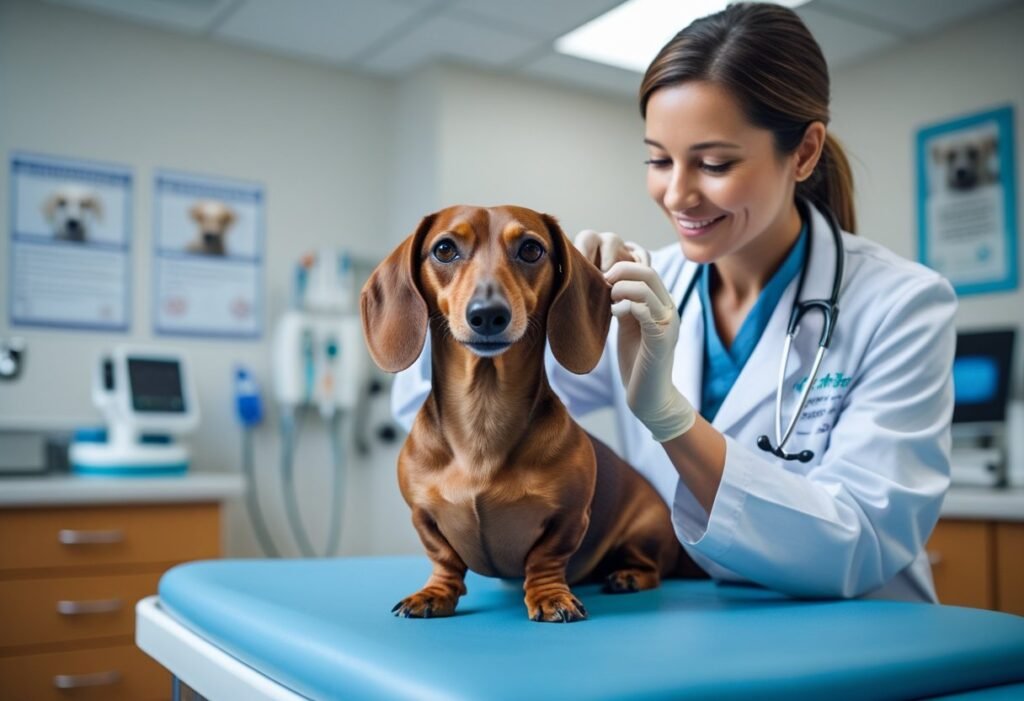
Vets check your dog’s body condition and offer feeding advice. It’s honestly so important to keep your dachshund slim.
Other issues to watch for include dental disease, allergies, and eye problems like cataracts. 🌸 Dachshunds can also have seizures or heart issues.
Regular vet check ups let your vet keep an eye on these breed-specific risks. 🔍
Dachshund-Specific Screening Guidelines 📋
Vets use special guidelines for dachshunds. If your dog shows back pain or weakness, they might recommend X-rays. 🩻
Routine spinal exams start to matter a lot after age 3.
Screenings your vet might recommend:
| Age Range | Screening/Check | Reason |
|---|---|---|
| Puppy – 1 year | Vaccines, deworming | Build strong immunity 🐾 |
| 1 – 7 years | Annual exams, dental | Prevent early health issues 🦷 |
| 7+ years | Bloodwork, X-rays | Check for age-related changes 🧪 |
Your vet may check the eyes for blindness and listen for heart murmurs. 🎧 If your dachshund’s family line has epilepsy or heart disease, extra tests might be a good idea.
Keeping a record of all screenings helps you and your vet track your dog’s health as they get older. 🗂️
Recommended Veterinary Schedule for Dachshunds
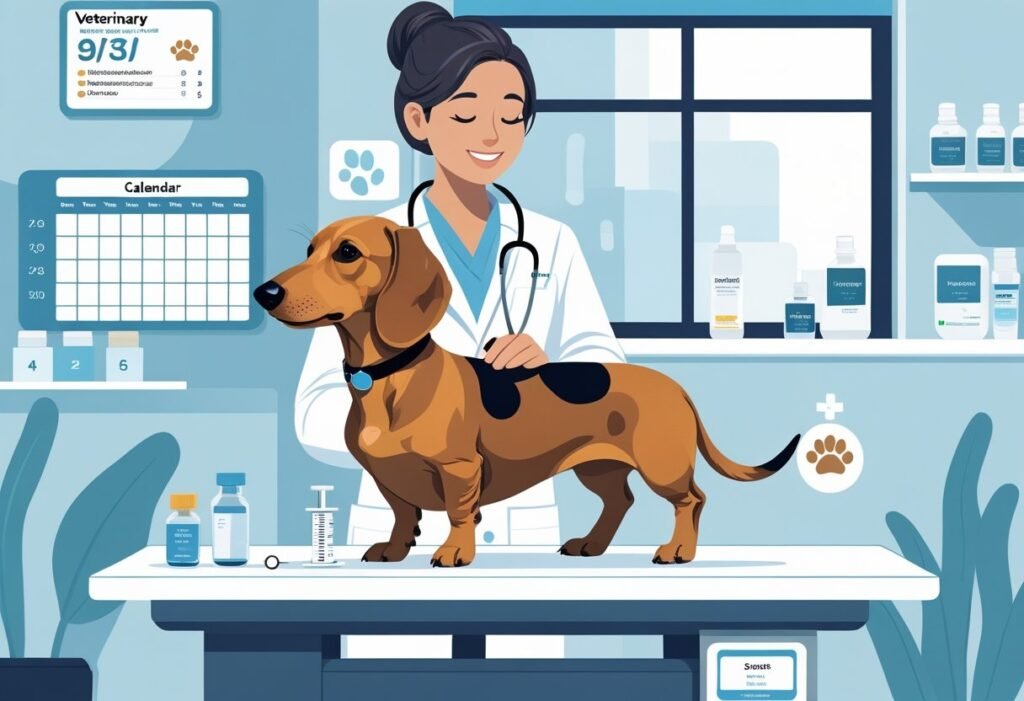
Routine vet visits catch health problems early in dachshunds. 🐾 Knowing what to expect at each stage of your dog’s life makes it easier to keep them healthy.
How Often to Take Your Dachshund to the Vet 🩺
Puppies should visit the vet every 3–4 weeks until about 16 weeks old. 🐶 These visits cover vaccinations, deworming, and growth checks.
Adult Dachshunds (1–7 years old) need a full checkup, heartworm test, vaccine boosters, and dental check once a year. 🦷
Senior Dachshunds (over 7 years) benefit from a vet visit every 6 months. ⏳ Older dogs face higher risks, so more frequent visits help spot problems early.
Annual checkups usually include:
- Nose-to-tail physical exam 🐕
- Vaccinations 💉
- Bloodwork and urine tests 🧪
- Weight and diet review ⚖️

🍽️ ChefPaw Food Maker
- Control ingredients for sensitive Dachshund tummies
- Easy portioning supports healthy weight at vet check ups
- Fresh meals for energy and coat health

🥗 Wild Earth Complete Protein Dog Food
- Balanced, plant-based recipe supports healthy labs at check ups
- Consistent formula helps avoid dietary flare-ups
- Great for weight control and daily vitality
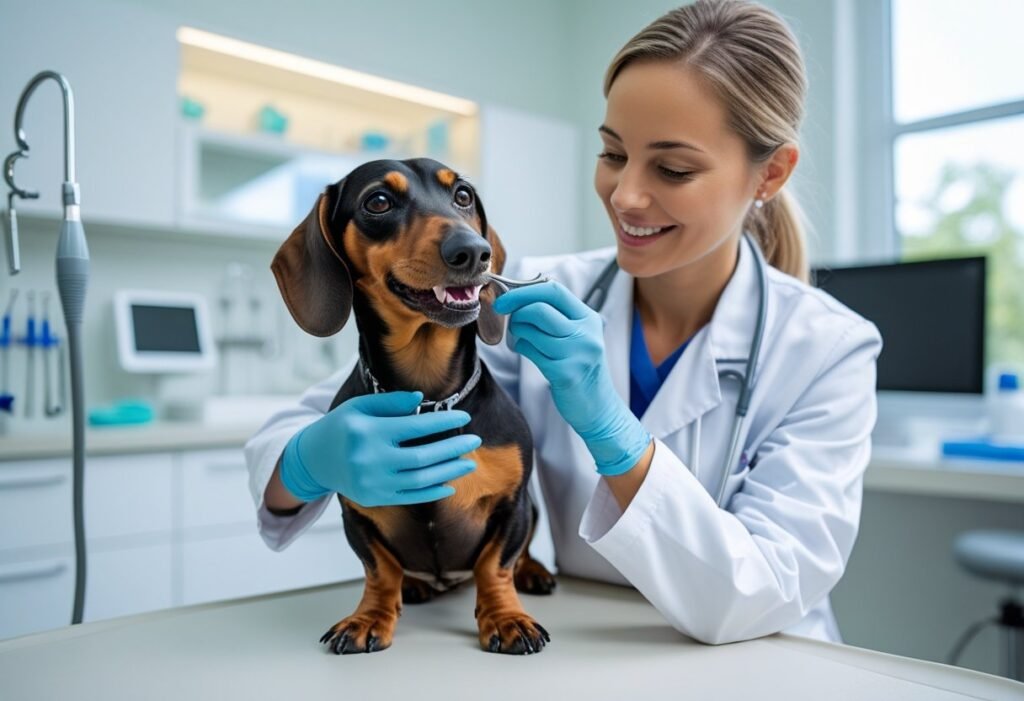
Stages of Life and Their Vet Needs 📋
Puppy stage: Early vet visits focus on vaccination schedules, flea and tick prevention, and advice about nutrition and growth. 🍼
Spaying or neutering usually happens between 6–12 months old. ✂️ During adulthood, annual vet visits help maintain your dachshund’s health, watch for weight gain, monitor teeth, and prevent parasites. 🐾
Many dogs start dental cleanings around this age. 🪥 In the senior years, twice-yearly visits help check for arthritis, heart problems, kidney function, and lumps or bumps. ❤️
Your vet may run extra tests to monitor your dachshund’s aging body. 🔍
Dachshund Preventative Care Practices
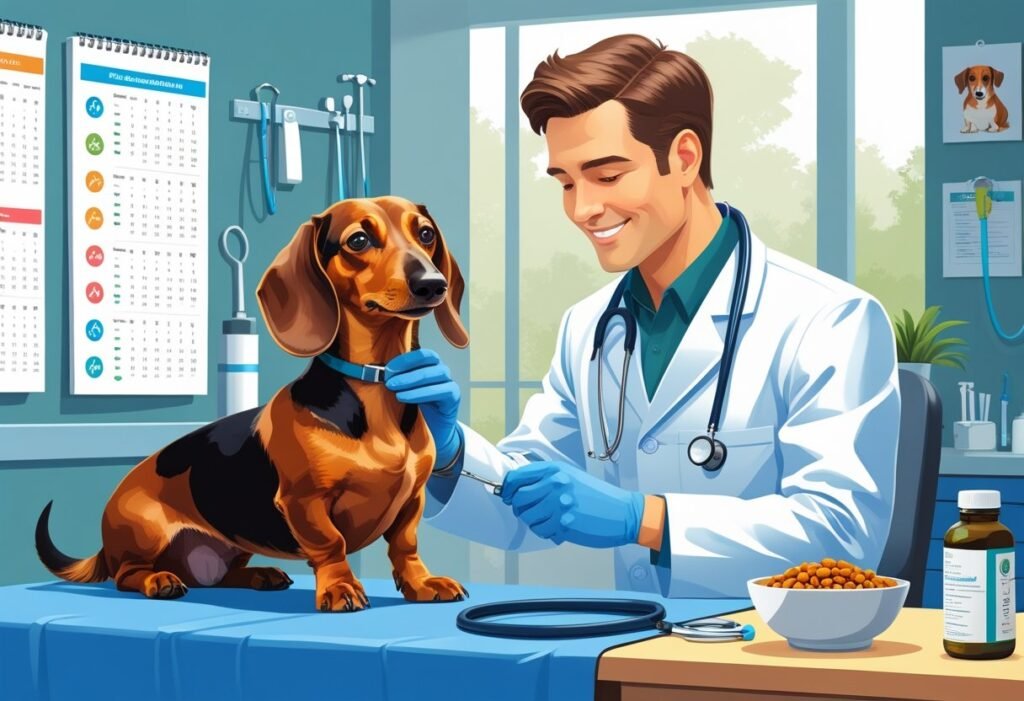
Dachshunds need routine medical care to lower the risk of illness and live a long, healthy life. 🐾 Staying up to date with vaccines and monthly preventives protects your dog from common diseases and parasites.
Vaccinations and Immunizations 💉
Vaccines help your dachshund’s immune system fight off serious diseases. 🦠 Puppies should get a series of shots starting around 6–8 weeks old. 🐶
Key vaccines include:
- Rabies 🐕
- Distemper 🩺
- Parvovirus 🧬
- Adenovirus 🩹
- Bordetella (kennel cough) 🌬️
Most vaccines need boosters as your dog grows. Adult dachshunds usually need shots every 1–3 years, depending on your vet’s advice and local laws. 📅
If your dachshund visits parks, daycare, or boarding, ask your vet about extra protection like Leptospirosis or Canine Influenza. 🐾 Keep a written record or have your clinic provide a vaccine schedule for easy tracking. 🗂️

⏰ Petlibro Automatic Feeder
- 🐾 Keep feeding times steady to support a healthy metabolism
- Helps your Doxie stay on track between vet visits and weigh-ins
- 🍽️ Ideal for portion control to prevent obesity and back strain
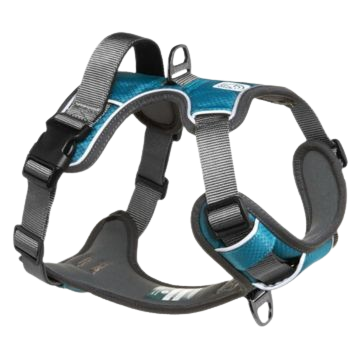
🎽 Embark Pet Adventure Harness
- 🩺 Perfect for safe, secure walks before or after vet appointments
- Distributes pressure evenly to protect your Doxie’s back and chest
- 💛 Adjustable fit ensures comfort and control during travel or exams

Parasite Prevention and Control 🐜
Parasites like fleas, ticks, worms, and mites can really make your dachshund miserable 😣 and spread diseases. Monthly parasite prevention is key for dachshunds.
Common parasites to guard against include:
- Fleas 🪳
- Ticks 🕷️
- Heartworms ❤️
- Roundworms and hookworms 🐛
Use vet-approved flea and tick preventives — pills, chews, or topical treatments all work. 💊 Most dogs need heartworm meds year-round now.
Your vet may suggest annual heartworm tests and fecal parasite checks. 🧪 Clean your dog’s bedding and living areas often 🧼, and check for ticks and fleas after outdoor time. 🌳
Quick action helps avoid bigger problems and keeps your dog comfortable. 😊
Key Health Screening and Tests for Dachshunds
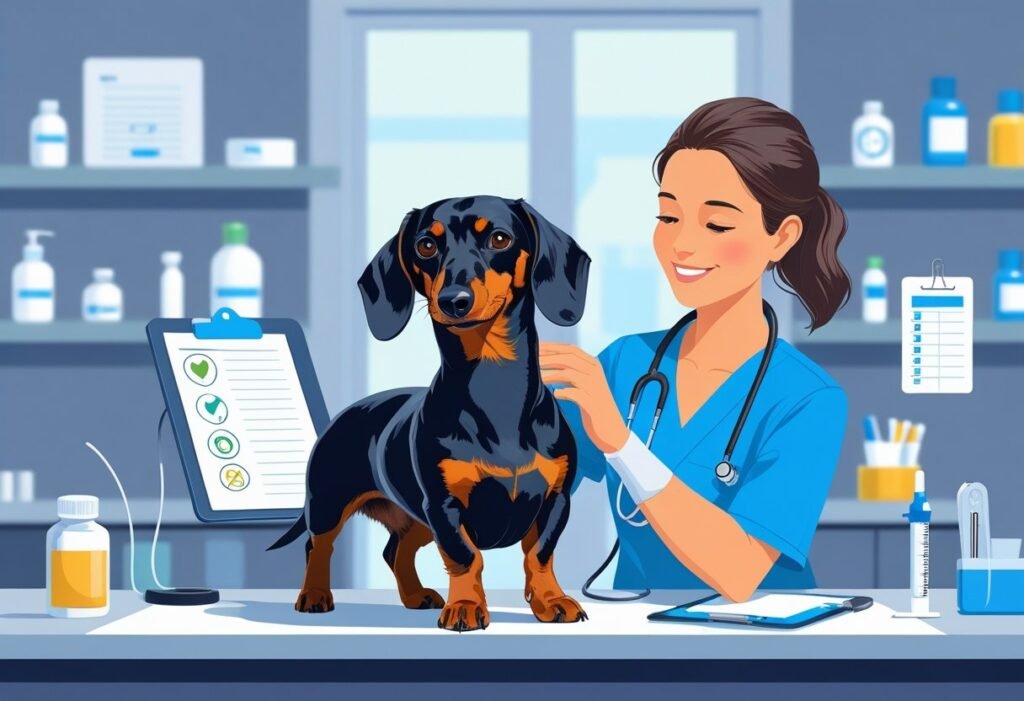
Dachshunds face unique health risks thanks to their long backs, dental quirks, and breed genetics. 🐾 Staying on top of certain vet check ups catches problems early and helps your dog stay comfortable and active.
Spine and Back Health Monitoring 🦴
Dachshunds are prone to Intervertebral Disc Disease (IVDD) because of their long spine. 🐕 Your vet should check your dog’s back and spine alignment at each check up.
Watch for signs like:
- Sudden pain or yelping 😣
- Trouble walking or jumping 🚫
- Weakness in the back legs 🦵
- Reluctance to be touched along the back 🙁
If your vet suspects a problem, they might use X-rays, neurological exams, or advanced imaging to check for slipped or damaged discs. 🩻 Early detection really improves the odds of recovery and can prevent paralysis.
Routine weight checks matter, too, since extra pounds increase the risk of back problems. ⚖️ Keeping your dachshund at a healthy weight reduces spinal stress. 💪

🧪 AnimalBiome Gut Health Test Kit
- 🩺 Get data-driven insights before your next vet visit
- Identifies gut imbalances that may affect immunity or digestion
- 💩 Simple at-home test for proactive, preventive care

🌿 Zumalka Calmpet Anxiety Relief Drops
- 🧘 Naturally calms your Doxie before vet appointments
- Reduces trembling, whining, or stress during exams
- 🌸 Gentle, safe formula for all ages and sensitivities
Dental Exams 🦷
Dental problems are common in dachshunds because of their narrow jaws and crowded teeth. 🪥 Your vet will check for tartar, gum disease, and loose or broken teeth during exams.

🎉 Grab your free Dachshund care checklist!
If dental disease shows up, your vet may recommend a professional cleaning under anesthesia. 🩺 Sometimes, teeth need to be pulled.
Ignoring dental problems can lead to:
- Bad breath 😷
- Pain when eating 🍽️
- Infection 🦠
- Tooth loss 🪥
Brush your dog’s teeth at home and use dental-friendly treats or diets to help prevent issues. 🦴 Schedule dental exams at least once a year — more often if your dog’s had dental problems before. 📅
Heart Health Evaluations ❤️
Dachshunds can develop heart conditions, especially as they get older. ⏳ During vet check ups, your vet listens for heart murmurs or odd rhythms with a stethoscope. 🎧
Key heart tests include:
- Auscultation (listening to heart sounds) 🎵
- Electrocardiogram (ECG) 🫀
- Chest X-rays 🩻
- Blood pressure checks ⬆️
Early signs of heart disease in Dachshunds:
- Coughing or difficulty breathing 😮💨
- Fatigue after exercise 🐕
- Swollen belly 🌀
- Fainting spells ⚠️
Nutrition and Weight Management
Feeding your Dachshund the right diet and keeping them at a healthy weight really helps prevent back and joint issues. 🐾 Paying attention to food choices and portion size goes a long way for their health.
Dietary Recommendations 🥗
Dachshunds need high-quality food with lots of protein and not much filler. 🍽️ Pick foods with meat as the main ingredient and skip the ones packed with corn, soy, or by-products. 🚫
Feeding the right amount keeps their metabolism steady and their energy up. ⚡
Key nutrients for Dachshunds:
- Lean protein (chicken, turkey, fish) 🐟
- Healthy fats (omega-3, omega-6) 🥜
- Fiber (sweet potato, brown rice) 🌾
- Vitamins and minerals (vitamin E, calcium, phosphorus) 💊
Feed adult Dachshunds twice a day. 🕑 Measure meals with a standard cup to avoid overfeeding. 🥄
Treats should be small and less than 10% of their daily food. 🍏 Keep fresh water available at all times. 💧
Check food labels and follow your vet’s advice for amounts that fit your dog’s age, weight, and activity level. 📋

🛏️ Majestic Pet Orthopedic Bed
- 💤 Provides gentle support after vet visits or vaccinations
- Relieves pressure on your Dachshund’s spine and joints
- 🩺 Promotes faster recovery and restful, healing sleep

🧴 Pride + Groom Grooming Tools Kit
- 🪶 Keep your Doxie fresh and clean between vet checkups
- Helps remove loose fur, dander, and buildup gently
- ✨ Promotes healthy skin and coat with consistent care

Obesity Prevention for Dachshunds ⚖️
Dachshunds are more likely than some breeds to get overweight, which puts stress on their backs and joints. 🦴 Keeping your dog slim lowers their risk for intervertebral disc disease (IVDD).
Signs your Doxie may be overweight:
- Struggling to feel ribs 🤲
- Difficulty jumping or walking 🚫
- Tiredness after little activity 😴
Tips for weight control:
- Weigh your dog monthly 📏
- Use low-calorie treats like carrot sticks or apple slices 🥕
- Avoid table scraps and high-calorie snacks 🚫
- Provide daily exercise such as short walks or playtime 🐕
Ask your vet about a healthy weight range for your dog. 🩺 Stick to a routine for feeding and exercise. 📅
If your Dachshund starts gaining weight, cut back food just a bit and add some activity. 🏃
Recognizing Early Signs of Illness
Spotting a health problem early can make a huge difference for your Dachshund. 🐾 Watch for both physical and behavior changes to help keep your dog safe and comfortable.
Behavioral and Physical Changes to Watch For 👀
If your Dachshund acts differently, pay attention. 🔍 Signs like hiding, sleeping more or less, or not wanting to play might mean something’s wrong.
If your Doxie stops eating, drinks much more or much less than usual, or suddenly has accidents inside, these could be warning signs. 🚩
Physical changes matter too. Notice if you see weight loss, swelling, limping, or trouble moving. 🦴
Coughing, sneezing, diarrhea, or vomiting shouldn’t be ignored. 🤧 Check their fur and skin for redness, bald spots, or sores. 🐕
Common early signs to watch for:
| Change | What to Look For |
|---|---|
| Appetite | Won’t eat or drink, eats less 🥣 |
| Activity Level | Less playful or very tired 😴 |
| Bathroom Habits | Accidents, difficulty peeing 🚽 |
| Movement | Limping, stiffness, trouble jumping 🦵 |
| Appearance | Bumps, rashes, dull fur 🐩 |
Good preventative care means noticing these changes before they turn serious. 🛡️

📹 Petcube Cam 360
- Check on your Doxie during post-vet rest
- Two-way audio for reassurance and routine
- Clear night vision for peace of mind
📍 Tractive GPS Tracker
- Real-time tracking and activity monitoring
- Set safe zones and get instant alerts
- Waterproof design for everyday adventures

When to Seek Immediate Veterinary Attention 🚨
Some symptoms in Dachshunds need quick action. Don’t wait if you see any of the following:
- Difficulty breathing 😮💨
- Seizures or severe shaking ⚡
- Sudden collapse or trouble standing 🚫
- Uncontrolled bleeding 🩸
- Swollen, hard belly 🌀
- Persistent vomiting (more than once in 24 hours) 🤢
- Loss of use of back legs 🐾
A Dachshund’s long back makes them more likely to have spinal injuries. 🩻 Signs like back pain, yelping, or trouble walking can be emergencies.
Call your vet or an emergency animal hospital if you’re unsure. 📞 Fast veterinary care can save your dog’s life. ❤️
Choosing the Right Veterinarian for Your Dachshund

Finding a good vet makes all the difference for regular Dachshund check ups. 🐾 You want someone who understands your dog’s special needs and actually listens to you. 👂
Questions to Ask Your Vet ❓
When you meet a new vet, bring a list of questions. 📝 Ask about their experience with Dachshunds, especially with back injuries and dental disease. 🦷
Here are a few questions you could ask:
- How do you prevent and treat IVDD (back problems) in Dachshunds? 🦴
- Are you familiar with the Dachshund vaccine schedule? 💉
- How do you help manage pain if my dog has back trouble? 😣
- Do you have a plan for emergency care if my Doxie needs it? 🚨
Look for clear answers. Your vet should explain things so you can actually make decisions for your dog’s health. 🐶
🌟 Smart Wellness Tools to Support Routine Vet Care & Daily Health
- 💧 Petlibro Water Fountain — Keeps your Dachshund hydrated year-round with a continuous flow of clean, filtered water. Essential for kidney and urinary health between vet visits.
- 📹 Petcube Bites 2 — Stay connected while you’re away! Monitor eating habits or post-appointment behavior, and toss treats to reward calm, positive actions.
- 🪜 Majestic Pet Stairs — Help your Doxie safely reach couches or beds after checkups or treatments. Prevents jumping strain and supports spinal and joint health.
- 🧠 Brain Training for Dogs — Stimulate your Dachshund’s mind with fun, easy exercises that improve focus and reduce stress before and after vet visits.

Working With Dachshund-Experienced Professionals 🩺
Dachshunds have their own quirks, especially with their backs and weight. ⚖️ A vet who’s seen lots of Doxies will know what to check for at every visit.
Doctors with Dachshund experience can give advice about diet, exercise, and prevention that fits your dog. 🍎 They’ll know what activities are safe and what warning signs really matter.
It’s worth asking if the clinic has special equipment, like ramps or low tables, to help long-backed dogs. 🛠️ That kind of attention helps keep your Dachshund comfortable during exams. 💛
Keeping Track of Your Dachshund’s Health Over Time
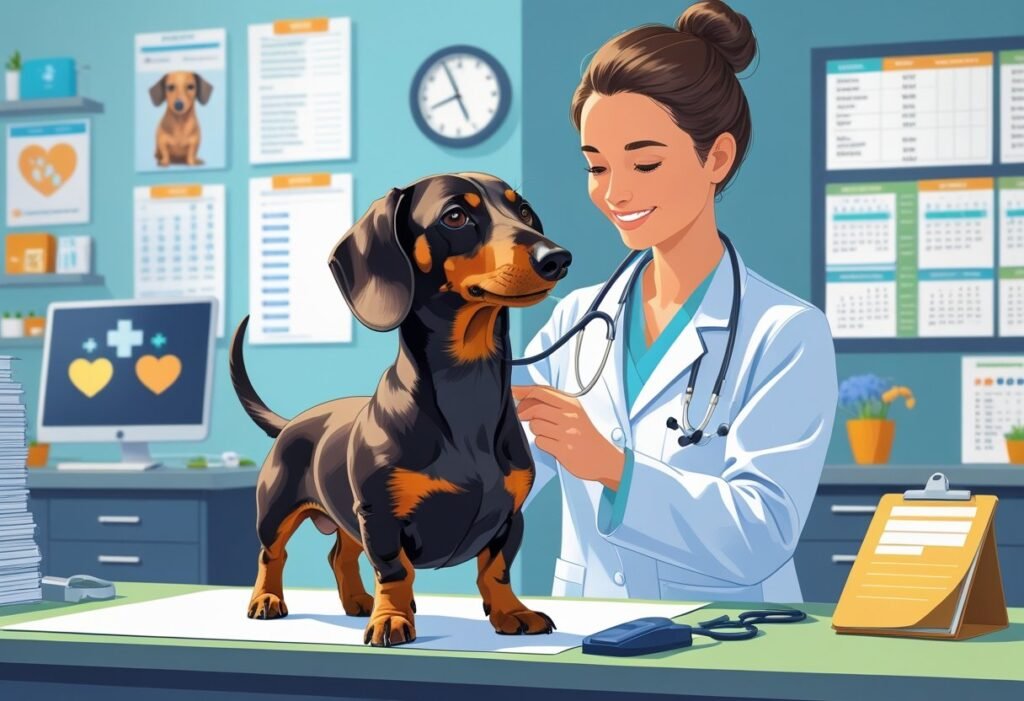
To catch health problems early, pay close attention to your dachshund’s health records and regular vet visits. 🐾 Staying organized helps you spot changes and act quickly if something’s off.
Maintaining Health Records 📂
Keep detailed records for every vet visit, vaccination, and medication. 🩺 Store both paper and digital copies of exam reports, test results, and vaccination certificates.
Make a simple health log. 📝 Include the date, reason for the visit, vet’s name, diagnosis, medicines, and next steps.
Update it after each appointment. You can use a notebook, spreadsheet, or a pet health app. 📱
Here’s an example table for easy tracking:
| Date | Vet Visit Purpose | Notes & Diagnosis | Medications | Next Steps |
|---|---|---|---|---|
| 2025-04-10 | Annual check-up | Healthy, up-to-date 🐶 | None | Return in 1 year 📅 |
| 2025-06-01 | Coughing | Mild allergy 🌸 | Antihistamine 💊 | Monitor symptoms 👀 |
Keeping these records helps you and your vet make better decisions, especially if your dachshund gets sick or needs emergency care. 🚑
💛 Everyday Wellness & Comfort for Vet Visits and Beyond
- 🎽 Coastal Pet Harness (IVDD Version) – Ensures secure, pressure-free walks before or after vet visits. Designed to reduce strain on your Dachshund’s back and chest for safe outings.
- 🌿 Innovet PurCBD Oil – Promotes calm behavior during checkups or recovery. Helps ease anxiety, discomfort, or stiffness naturally and safely.
- 🧴 King Klean Dog Shampoo – A soothing, all-natural formula for sensitive skin that keeps your Doxie’s coat soft and healthy after long vet days or outdoor play.
- 🎨 Purr & Mutt Personalized Dachshund Art – Celebrate your loyal companion with a custom art piece that captures your Doxie’s unique charm and spirit.
- 👕 Dog is Good Apparel & Gifts – Show off your Dachshund pride with fun, inspiring designs that reflect your love and dedication as a caring pet parent.
🩺 These essentials make every vet visit smoother and every day healthier — helping your Doxie feel calm, comfortable, and loved through every stage of care.
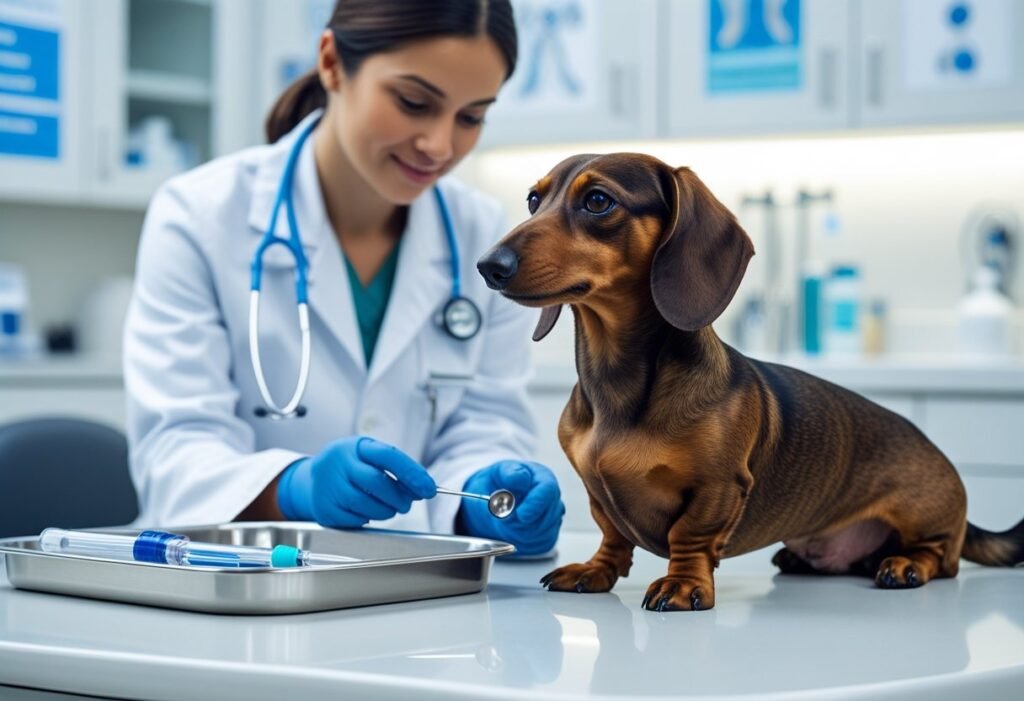
Scheduling and Reminders ⏰
Regular check-ups are key for catching health issues early. 🛡️ Your dachshund may need annual or twice-a-year vet visits, depending on age and health.
Set reminders for vet appointments and follow-up care in your phone, calendar, or a pet health app. 📅 Add vaccine renewal dates and medication refills so you don’t forget. 🗂️
Many vet offices offer text or email reminders. 📧 Ask your vet to add you to their notification system.
Consistent reminders help you stay on track with your dachshund’s care schedule and lower the risk of missing appointments. ✅
🐾 Don’t Miss Out!
Download our free Dachshund care guide to keep your furry friend happy and healthy.
Get Your Free Guide 🐶Frequently Asked Questions
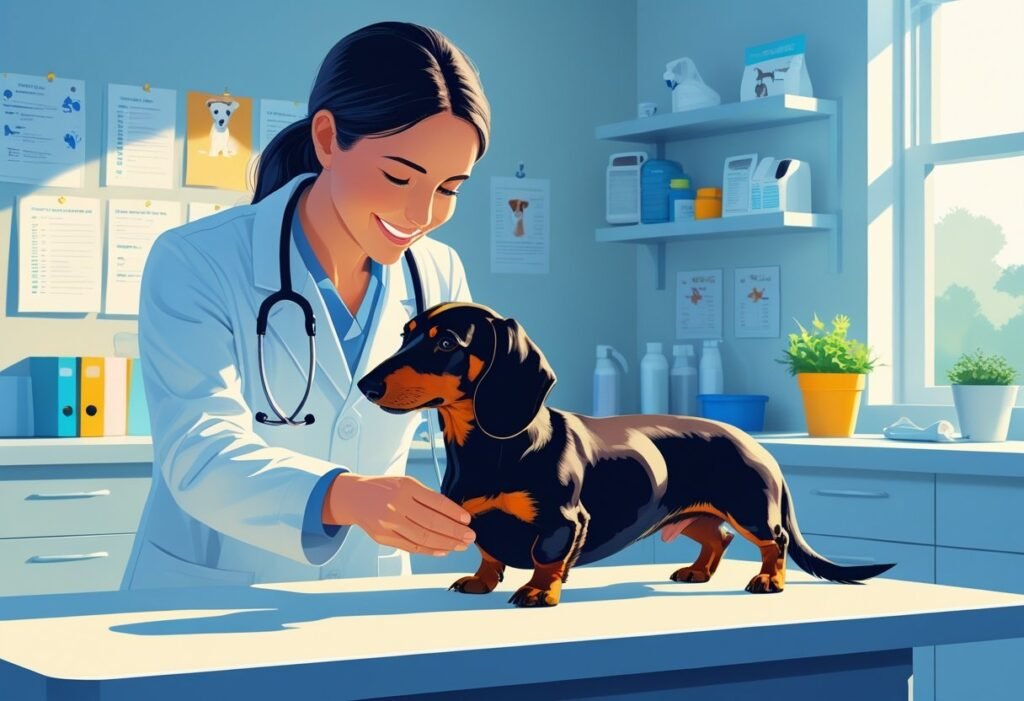
Senior dachshunds often deal with back problems and joint pain. 🦴 Managing their weight, checking for genetic conditions, and going to the vet regularly all matter for their long-term health. 🐾
What are common health issues faced by senior dachshunds? 🩺
Senior dachshunds are prone to intervertebral disc disease (IVDD), arthritis, and heart disease. ❤️ Dental issues and vision problems can also develop as your dog ages. 👀
Regular check-ups help catch these problems early. ⏳
How can you prevent hip dysplasia in dachshunds? 🦵
Feed your dog a balanced diet to support bone health. 🥗 Keep your dachshund at a healthy weight since extra pounds stress the joints. ⚖️
Avoid high jumps and hard landings that could injure their hips and back. 🚫
What steps should be taken to manage obesity in dachshunds? ⚖️
Measure food portions carefully and skip the table scraps. 🍽️ Make sure your dachshund gets daily exercise, even if it’s just short walks and gentle play. 🐕
If you notice weight gain, talk to your vet about a diet plan. 📋
What are some genetic disorders commonly found in dachshunds? 🧬
Dachshunds deal with IVDD pretty often, which affects their spines. 🦴 They might also get eye problems, like progressive retinal atrophy (PRA). 👁️
Some dachshunds develop heart issues, too. ❤️ Regular screening can catch these genetic problems before they get worse. 🔍
How can I prolong the lifespan of my dachshund? ⏳
Take your dachshund to the vet regularly and keep their vaccinations current. 💉 Give them healthy food, but don’t overdo it on treats. 🥕
They need exercise, though you should stop them from jumping off high places — it’s not worth the risk. 🚫 Don’t forget about dental care 🪥, and try to get yearly bloodwork done if you can. 🧪
What are essential maintenance tips for dachshund owners? 📋
Brush your dachshund’s coat once a week to help with shedding. 🐕 Clip their nails every few weeks. ✂️ Brush their teeth often, even if they’re not thrilled about it 🪥.
Keep an eye on their weight and make sure they stay active. ⚖️ Stay on top of worming and flea treatments — those little things sneak up on you. 🐜

